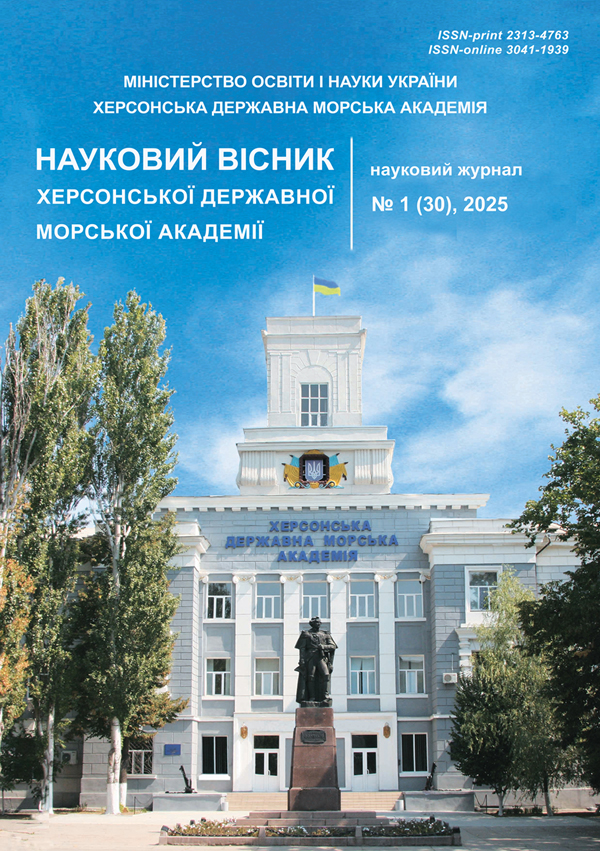DECISION SUPPORT SYSTEM FOR SELECTING A VESSEL MANEUVER ACCORDING TO THE REQUIREMENTS OF THE COLREG-72
https://doi.org/10.33815/2313-4763.2025.1.30.133-144
Abstract
The article is devoted to the issues of application of the Convention on the International Regulations for Preventing Collisions at sea, 1972 (COLREG-72) in decision support systems (DSS) of the ship navigator. The analysis of research in the field of creation of formal models of COLREG-72 and their practical application in vessel traffic control systems is carried out. It was revealed that at the current time a promising direction of scientific research is the creation of methods for assessing the level of danger of navigational situations in accordance with the requirements of COLREG-72, adapted for use in DSS of the ship navigator. It has been proven that an important aspect of the successful application of COLREG-72 in navigation is not only the creation of their adequate formal models adapted to the use of the ship's DSS and automated vessel traffic control systems, but also the development of training systems for training marine specialists in order to increase their competence in the field of practical skills in applying rules while keeping watch on the navigation bridge. A classification of navigation situations that arise in the process of vessels diverging in accordance with the requirements of COLREG-72 and a method for assessing the level of their danger in accordance with the parameters of vessel movement have been developed. The proposed classification and method for assessing the level of danger of navigation situations have been implemented in the ship navigator's DSS, which is integrated with the navigation equipment of the Wartsila "Navi-Trainer Professional 5000" simulator. Software tools have been created to implement information exchange between the DSS and the simulator's navigation equipment in real time, which allows for constant monitoring of the process of changing navigation situations. The priority area of practical application of the created DSS is to provide simulator training for marine specialists in order to obtain practical skills in using COLREG-72 on the ship's navigation bridge. A promising area of further research is the development of a separate DSS software module for conducting statistical analysis of the success of simulator training of specialists who undergo it on a navigation simulator, in terms of determining the difficulties of applying individual rules of COLREG-72 for different types of navigation situations and sailing conditions.
References
2. Kulakov, M. A., Kozachenko, A. Yu. and Stepanenko, V. V. (2018). Hybrid control system by cooperation of vessels in situation of their dangerous rapprochement. “Судноводіння / Shipping & Navigation (28) https://doi.org/10.31653/2306-5761.27.2018.103-108.
3. Lee, C., Park, J., and Kim, J. (2025). “Efficient COLREGs-Compliant Collision Avoidance using Turning Circle-based Control Barrier Function,” arXiv preprint arXiv:2504.19247, 2025.
4. Mohovic, D., Mohovic, R., Baric, M. (2016). Deficiencies in Learning COLREGs and New Teaching Methodology for Nautical Engineering Students and Seafarers in Lifelong Learning Programs. Journal of Navigation. 69(4):765–776. https://doi.org/10.1017/S037346331500096X.
5. Ahmed, Y. A., Hannan, M. A., Oraby, M. Y., & Maimun, A. (2021). COLREGs Compliant Fuzzy-Based Collision Avoidance System for Multiple Ship Encounters. Journal of Marine Science and Engineering, 9(8), 790. https://doi.org/10.3390/jmse9080790.
6. Zhong, S., Wen, Y., Huang, Y., Cheng, X., and Huang, L. (2022). “Ontological Ship Behavior Modeling Based on COLREGs for Knowledge Reasoning,” J. Mar. Sci. Eng., vol. 10, no. 2, p. 203, https://doi.org/10.3390/jmse10020203.
7. Barbara, Stępień (2024). Towards a New Horizon: 1972 COLREG in the Era of Autonomous Ships, Ocean Development & International Law, 55:1–2, 170–184, https://doi.org/10.1080/00908320.2024.2359908.
8. Ergun, D., and Dinçer, B. (2015). The Further Studies On The COLREGs (Collision Regulations). TransNav, the International Journal on Marine Navigation and Safety of Sea Transportation. 9. P. 17–22. https://doi.org/10.12716/1001.09.01.02.
9. Kreutzmann, A., Wolter, D., Dylla, F., and Lee, J. H. (2013). “Towards Safe Navigation by Formalizing Navigation Rules,” TransNav, the International Journal on Marine Navigation and Safety of Sea Transportation, vol. 7, no. 2, pp. 161–168, https://doi.org/10.12716/1001.07.02.01.
10. IMO. Convention on the international regulations for preventing collisions at Sea, 1972 (COLREGs).
11. Aylward, K., Weber, R., Lundh, M., MacKinnon, S. N., Dahlman, J. (2022). Navigators’ views of a collision avoidance decision support system for maritime navigation. The Journal of Navigation 75: 5, 2022. 1035–1048. https://doi.org/10.1017/S0373463322000510.
12. Ahmed, Y. A., Hannan, M. A., Oraby, M. Y., Maimun, A. (2021). COLREGs Compliant Fuzzy-Based Collision Avoidance System for Multiple Ship Encounters. J. Mar. Sci. Eng. 9, 790. https://doi.org/ 10.3390/jmse9080790.
13. Zhong, S., Wen, Y., Huang, Y., Cheng, X., Huang, L. (2022). Ontological Ship Behavior Modeling Based on COLREGs for Knowledge Reasoning. J. Mar. Sci. Eng. 10, 203. https://doi.org/10.3390/ jmse10020203.
14. Kreutzmann, A., Wolter, D., Dylla, F. & Lee, J. H. (2013). Towards Safe Navigation by Formalizing Navigation Rules. TransNav, the International Journal on Marine Navigation and Safety of Sea Transportation. 2013. Vol. 7, № 2. Р. 161–168. 10.12716/1001.07.02.01.
15. Nosov, P. S., Zinchenko, S. M., Ben, A. P., Nahrybelnyi, Ya. А., Dudchenko, O. M. (2019). Models of decision making by a navigator under implicit agreements with colreg rules. Науковий вісник Херсонської державної морської академії. №1 (20). С. 31–38. https://doi.org/10.33815/2313-4763.2019.1.20.031039.
16. Hansen, Peter & Papageorgiou, Dimitrios & Blanke, Mogens & Galeazzi, Roberto & Lützen, Marie & Mogensen, John & Bennedsen, Mette & Hansen, Dorte (2020). COLREGs-based Situation Awareness for Marine Vessels – a Discrete Event Systems Approach. IFAC-PapersOnLine. 53. 14501–14508. https://doi.org/10.1016/j.ifacol.2020.12.1453.
17. Demirel, E. & Bayer, D. (2015). Further Studies On The COLREGs (Collision Regulations). TransNav, the International Journal on Marine Navigation and Safety of Sea Transportation. Vol. 9, № 1. Р. 17–23. https://doi.org/10.12716/1001.09.01.02.
18. Ben, A. P. (2024). Systemy pidtrymky pryiniattia rishen v sudnovodinni: suchasnyi stan ta perspektyvy podalshoho rozvytku. Naukovyi visnyk Khersonskoi derzhavnoi morskoi akademii. № 1 (28). S. 152–162. https://doi.org/10.33815/2313-4763.2024.1.28.152-162.
19. Ben, A. P., Maltsev, A. S. (2019). Systemy pidtrymky pryiniattia rishen shchodo upravlinnia rukhom sudna // Monohrafiia. Kherson : Vydavnytstvo KhDMA. 244 s.
20. Pietrzykowski, Z., Wołejsza, P., Borkowski, P. (2017). Decision support in collision situations at sea. J. Navig. Vol. 70. P. 447–464. https://doi.org/10.1017/S0373463316000746.






